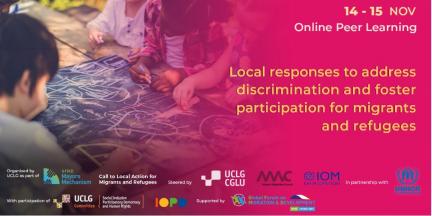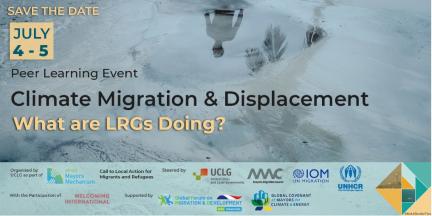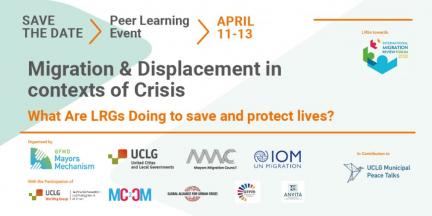Learn
Welcome to the Call to Local Action for Migrant and Refugees space for learning. In order to create a stronger, people-centred narrative on migration and displacement governance, it is important to empower and help develop the capacities of various stakeholders at the local level to implement pragmatic and principled actions. They also serve as critical input to shape our advocacy messages and identify inspirational local leadership and expertise.
Massive Online Open Course
Discover our Massive Online Open Course on “Localising the Global Compacts on Migration and Refugees - Territorial Action on Human Mobility”
Here, you will learn about the role of local and regional governments in managing migration, about their actions, and their contribution to global agendas. Podcasts, animated videos, games, and questionnaires will guide you through the different modules of this course.
Peer learning sessions
The Mayors Mechanism periodically organises peer learning events for local and regional government officials. Currently there are no planned peer learning sessions. Below you can find summaries of past peer learning sessions.
3. Local Responses to Address Discrimination and Foster Participation for Migrants and Refugees
14 - 15 November, 2023
In this peer learning event “Local Responses to Address Discrimination and Foster Participation for Migrants and Refugees”, cities and partners discussed what it takes to create welcoming environments that uphold human rights and enhance social cohesion and economic vitality. It focussed on practices that combat discrimination and foster political participation of migrants and refugees, alongside the communities they live in.
The session was kicked off by an in-person workshop a the 22nd IOPD Conference in Rio de Janeiro.
2. Climate Migration and Displacement: What are LRGs doing?
4 - 5 July, 2023
In this peer learning on climate induced human mobility, about 180 municipal workers and practitioners from about 20 cities, city networks, civil society, international organisations and academia discussed emerging trends, promising practices and territorial challenges to improve the livelihoods of communities while contributing to achieve global climate and human mobility goals.
The session was kicked off by an in-person workshop hosted by the City of Paris to discuss the results of their “Climate Migration in Urban Areas: Challenges, Representations, and Inclusion” project.
1. Migration and Displacement Amidst Crises: From Humanitarian to Sustainable Responses
11 - 13 April, 2022
In the session “Migration and Displacement Amidst Crises: From Humanitarian to Sustainable Responses”, over 100 participants from local and regional governments (LRGs) from Europe, Africa, Latin America, and Asia, showcased the realities, initiatives and challenges of local and regional governments find in responding to the impacts of humanitarian emergencies and implementing sustainable and inclusive responses for migrants and displaced persons.


